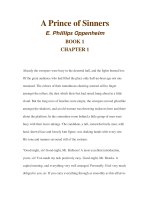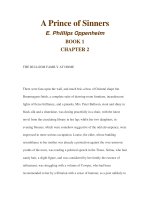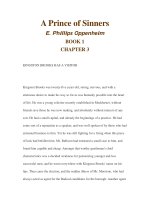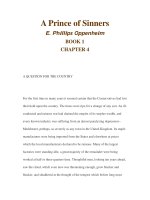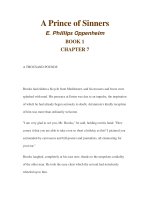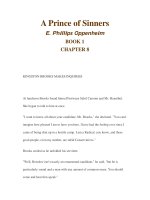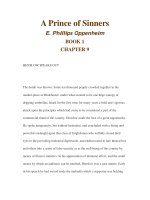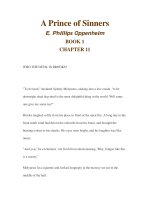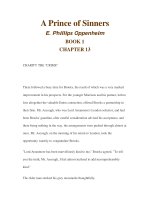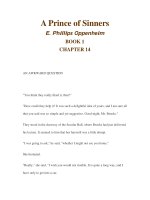A Prince of Sinners E. Phillips Oppenheim BOOK 2 CHAPTER 1 ppsx
Bạn đang xem bản rút gọn của tài liệu. Xem và tải ngay bản đầy đủ của tài liệu tại đây (32.81 KB, 15 trang )
A Prince of Sinners
E. Phillips Oppenheim
BOOK 2
CHAPTER 1
LORD ARRANMORE'S AMUSEMENTS
"The domestic virtues," Lord Arranmore said softly to himself, "being denied to
me, the question remains how to pass one's time."
He rose wearily from his seat, and walking to the window looked out upon St.
James's Square. A soft rain hung about the lamp-posts, the pavements were
thick with umbrellas. He returned to his chair with a shrug of the shoulders.
"The only elucidation from outside seems to be a change of climate," he mused.
"I should prefer to think of something more original. In the meantime I will
write to that misguided young man in Medchester."
He drew paper and pen towards him and began to write. Even his handwriting
seemed a part of the man cold, shapely, and deliberate.
"My DEAR BROOKS,
"I have been made acquainted through Mr. Ascough with your desire to leave
the new firm of Morrison and Brooks, and while I congratulate you very much
upon the fact itself, I regret equally the course of reasoning which I presume led
to your decision. You will probably have heard from Mr. Ascough by this time
on a matter of business. You are, by birth, Lord Kingston of Ross, and the
possessor of the Kingston income, which amounts to a little over two thousand a
year. Please remember that this comes to you not through any grace or favour of
mine, but by your own unalienable right as the eldest son of the Marquis of
Arranmore. I cannot give it to you. I cannot withhold it from you. If you refuse
to take it the amount must accumulate for your heirs, or in due time find its way
to the Crown. Leave the tithe alone by all means, if you like, but do not carry
quixotism to the borders of insanity by declining to spend your own money, and
thereby cramp your life.
"I trust to hear from Mr. Ascough of your more reasonable frame of mind, and
while personally I agree with you that we are better apart, you can always rely
upon me if I can be of any service to you.
"Yours sincerely,
"ARRANMORE."
He read the letter through thoughtfully and folded it up.
"I really don't see what the young fool can kick about in that," he said, throwing
it into the basket. "Well, Hennibul, how are you?"
Mr. Hennibul, duly ushered in by a sedate butler, pronounced himself both in
words and appearance fit and well. He took a chair and a cigarette, and looked
about him approvingly.
"Nice house, yours, Arranmore. Nice old-fashioned situation, too. Why don't
you entertain?"
"No friends, no inclination, no womankind!"
Mr. Hennibul smiled incredulously.
"Your card plate is chock-full," he said, "and there are a dozen women in town
at least of your connections who'd do the polite things by you. As to inclination-
-well, one must do something."
"That's about the most sensible thing you have said, Hennibul," Arranmore
remarked. "I've just evoked the same fact out of my own consciousness. One
must do something. It's tiresome, but it's quite true." Politics?
"Hate 'em! Not worth while anyway."
"Travel."
"Done all I want for a bit, but I keep that in reserve.
"Hunt."
"Bad leg, but I do a bit at it."
"Society."
"Sooner go on the County Council."
"City."
"Too much money already."
"Write a book." "No one would read it."
"Start a magazine."
"Too hard work."
Mr. Hennibul sighed.
"You're rather a difficult case," he admitted. "You'd better come round to the
club and play bridge."
"I never played whist and I'm bad-tempered."
"Bit of everything then."
Lord Arranmore smiled.
"That's what it'll end in, I suppose."
"Pleasant times we had down at Enton," Mr. Hennibul remarked. "How's the
nice young lawyer Brooks his name was, I think?"
"All right, I believe."
"And the ladies?
"I believe that they are quite well. They were in Scotland last time I heard of
them."
Mr. Hennibul found conversation difficult.
"I saw that you were in Paris the other week," he remarked.
"I went over to see Bernhardt's new play," Arranmore continued.
"Good?"
"It disappointed me. Very likely though the fault was with myself."
Mr. Hennibul looked across at his host shrewdly.
"What did you see me for?" he asked, suddenly. "You're bored to death trying to
keep up a conversation."
Lord Arranmore laughed.
"Upon my word, I don't know, Hennibul," he answered. "For the same old
reason, I suppose. One must see some one, do something. I thought that you
might amuse me."
"And I've failed," Hennibul declared, smiling. "Come to supper at the Savoy to-
night. The two new American girls from the Lyric and St. John Lyttleton are to
be there. Moderately respectable, I believe, but a bit noisy perhaps."
Arranmore shook his head.
"You're a good fellow, Hennibul," he said, "but I'm too old for that sort of
thing."
Hennibul rose to his feet.
"Well," he said, "I've kept the best piece of advice till last because I want you to
think of it. Marry!"
Lord Arranmore did not smile. He did not immediately reply.
"You are a bachelor!" he remarked.
"I am a man of a different disposition," Hennibul answered. "I find pleasure in
everything everything amuses me. My work is fascinating, my playtime is
never big enough. I really don't know where a wife would come in. However, if
ever I did get a bit hipped, find myself in your position, for instance, I can
promise you that I'd take my own medicine. I've thought of it more than once
lately."
"Perhaps by that time," Lord Arranmore said, "the woman whom you wanted to
marry wouldn't have you."
Hennibul looked serious for a moment. A new idea had occurred to him.
"One must take one's chances!" he said.
"You are a philosopher," Arranmore declared. "Will you have some tea or a
whisky-and-soda?"
"Neither, thanks. In an abortive attempt to preserve my youth I neither take tea
nor drinks between meals. I will have one of your excellent cigarettes and get
round to the club. Why, this is Enton over again, for here comes Molyneux."
The Hon. Sydney Molyneux shook hands with both of them in somewhat dreary
fashion, and embarked upon a few disjointed remarks. Hennibul took his leave,
and Arranmore yawned openly.
"What is the matter with you, Sydney?" he asked. "You are duller than ever. I
am positively not going to sit here and mumble about the weather. How are the
Carooms? Have you heard from them lately?"
"They are up in Yorkshire," Molyneux announced, "staying with the Pryce-
Powells. I believe they're all right. I'm beastly fit myself, but I had a bit of a
facer last week. I er I wanted to ask you a question.
"Well?"
"About that fellow Brooks I met at your place down at Enton. Lawyer at
Medchester, isn't he? I thought that he and Sybil seemed a bit thick somehow.
Don't suppose there could have been anything in it, eh? He's no one in
particular, I suppose. Lady Caroom wouldn't be likely to listen to anything
between Sybil and him?"
Arranmore raised his eyebrows.
"Brooks is a very intelligent young man," he said, "and some girls are attracted
by brains, you know. I don't know anything about his relations with Sybil
Caroom, but he has ample private means, and I believe that he is well-born."
"Fellow's a gentleman, of course," Molyneux declared, "but Lady Caroom is a
little ambitious, isn't she? I always seemed to be in the running all right lately. I
spent last Sunday with them at Chelsom Castle. Awful long way to go, but I'm
fond of Sybil. I thought she was a bit cool to me, but, like a fool, I blundered on,
and in the end I got a facer."
"Very sorry for you," Arranmore yawned.
"What made me think about Brooks was that she was awfully decent to me
before Enton," Molyneux continued. "I don't mind telling you that I'm hard hit. I
want to know who Brooks is. If he's only a country lawyer, he's got no earthly
chance with Lady Caroom, and Sybil'd never go against her mother. They're too
great pals for that. Never saw them so thick."
"Was Lady Caroom quite well?" Arranmore asked, irrelevantly.
"Well, now you mention it," Molyneux said, "I don't think she was quite in her
usual form. She was much quieter, and it struck me that she was aging a bit.
Wonderful woman, though. She and Sybil were quite inseparable at Chelsom
more like sisters than anything, 'pon my word."
Lord Arranmore looked into the fire, and was silent for several minutes.
"So far as regards Brooks," he said, "I do not think that he would be an
acceptable son-in-law to Lady Caroom, but I am not in the least sure. He is by
no means an insignificant person. If he were really anxious to marry Sybil
Caroom, he would be a rival worth consideration. I cannot tell you anything
more."
"Much obliged to you I'm sure. I shall try again when they come to town, of
course."
Arranmore rose up.
"I am going down to Christie's to see some old French manuscripts," he said. "Is
that on your way?"
Molyneux shook his head.
"Going down to the House, thanks," he answered. "I'll look you up again some
time, if I may."
They walked out into the street together. Arranmore stepped into his brougham
and was driven off. At the top of St. James's Street he pulled the check-string
and jumped out. He had caught a glimpse of a girl's face looking into a shop
window. He hastily crossed the pavement and accosted her, hat in hand.
"Miss Scott, will you permit me the opportunity of saying a few words to you?"
Mary turned round, speechless for more than a minute or two.
"I will not detain you for more than a minute or two. I hope that you will not
refuse me."
"I will listen to anything you have to say, Lord Arranmore," she said, "but let
me tell you that I have been to see Mr. Ascough. He told me that he had your
permission to explain to me fully the reasons of your coming to Montreal and
the story of your life before."
"Well?"
She hesitated. He stood before her, palpably anxiously waiting for her decision.
"I was perhaps wrong to judge so hastily, Lord Arranmore," she said, "and I am
inclined to regret my visit to Enton. If you care to know it, I do not harbour any
animosity towards you. But I cannot possibly accept this sum of money. I told
Mr. Ascough so finally."
"It is only justice, Miss Scott," he said, in a low tone. "I won the money from
your father fairly in one sense, but unfairly in another, for I was a good player
and he was a very poor one. You will do me a great, an immeasurable kindness,
if you will allow me to make this restitution."
She shook her head.
"If my forgiveness is of any value to you, Lord Arranmore," she said, "you may
have it. But I cannot accept the money."
"You have consulted no one?"
"No one."
You have a guardian or friends?
"I have been living with my uncle, Mr. Bullsom. He has been very kind to me,
and I have "
"Mary!"
They both turned round. Selina and Mr. Bullsom had issued from the shop
before which they stood, Both were looking at Lord Arranmore with curiosity,
in Selina's case mixed with suspicion.
"Is this your uncle?" he asked. "Will you introduce me?"
Mary bit her lip.
"Uncle, this is Lord Arranmore," she said. "Mr. Bullsom, my cousin, Miss
Bullsom."
Mr. Bullsom retained presence of mind enough to remove a new and very shiny
silk hat, and to extend a yellow, dog-skinned gloved hand.
"Very proud to meet your lordship," he declared. "I I wasn't aware "
Lord Arranmore extricated his hand from a somewhat close grasp, and bowed to
Selina.
"We are neighbours, you know, Mr. Bullsom," he said, "at Medchester. I met
your niece there, and recognized her at once, though she was a little slip of a girl
when I knew her last. Her father and I were in Montreal together."
"God bless my soul," Mr. Bullsom exclaimed, in much excitement. "It's your
lawyers, then, who have been advertising for Mary?"
Lord Arranmore bowed.
"That is so," he admitted. "I am sorry to say that I cannot induce your niece to
look upon a certain transaction between her father and myself from a business-
like point of view. I think that you and I, Mr. Bullsom, might come to a better
understanding. Will you give me an appointment? I should like to discuss the
matter with you."
"With the utmost pleasure, my lord," Mr. Bullsom declared heartily. "Can't
expect these young ladies to see through a business matter, eh? I will come to
your lordship's house whenever you like."
"It would be quite useless, uncle," Mary interposed, firmly. "Lord Arranmore
has already my final answer."
Mr. Bullsom was a little excited.
"Tut, tut, child!" he exclaimed. "Don't talk nonsense. I should be proud to talk
this matter over with Lord Arranmore. We are staying at the Metropole, and if
your lordship would call there to-morrow and take a bit of lunch, eh, about one
o'clock if it isn't too great a liberty."
Selina had never loved her father more sincerely. Lord Arranmore smiled
faintly, but good-humoredly.
"You are exceedingly kind," he said. "For our business talk, perhaps, it would
be better if you would come to St. James's House at, say, 10:30, if that is
convenient. I will send a carriage."
"I'll be ready prompt," Mr. Bullsom declared. "Now, girls, we will say good-
afternoon to his lordship and get a four-wheeler."
Selina raised her eyes and dropped them again in the most approved fashion.
Mr. Bullsom shook hands as though it were a sacrament; Mary, who was
annoyed, did not smile at all.
"This is all quite unnecessary, Lord Arranmore," she said, while her uncle was
signalling for a cab. I shall not change my mind, and I am sorry that you spoke
to uncle about it at all."
"It is a serious matter to me, Miss Scott," Lord Arranmore said, gravely. "And
there is still another point of view from which I might urge it."
"It is wasted time," she declared, firmly.
Selina detached herself from her father, and stood by Lord Arranmore's side.
"I suppose you are often in London, Lord Arranmore?" she asked shyly.
"A great deal too often," he answered.
"We read about your beautiful parties at Enton," she said, with a sigh. "It is such
a lovely place."
"I am glad you like it," he answered, absently. "I see your uncle cannot find a
four-wheeler. You must take my carriage. I am only going a few steps."
Mary's eager protest was drowned in Selina's shrill torrent of thanks. Lord
Arranmore beckoned to his coachman, and the brougham, with its pair of strong
horses, drew up against the pavement. The footman threw open the door. Selina
entered in a fever for fear a cab which her father was signalling should, after all,
respond to his summons. Mr. Bullsom found his breath taken away.
"We couldn't possibly take your lordship's carriage," he protested.
"I have only a few steps to go, Mr. Bullsom, and it would be a kindness, for my
horses are never more than half exercised. At 10:30 to-morrow then."
He stood bareheaded upon the pavement for a moment, and Selina's eyes and
smile had never worked harder. Mary leaned back, too angry to speak. Selina
and Mr. Bullsom sat well forward, and pulled both windows down.
